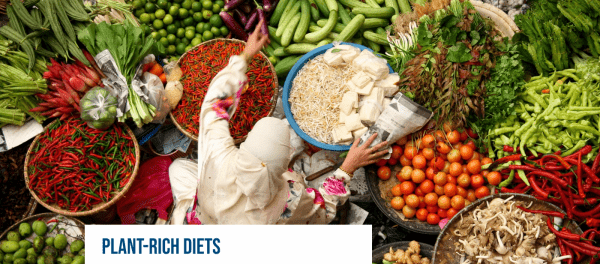Plant-Rich Diets

Plant-Rich Diets
Keywords: Plant Rich Diet, Climate
Website Link : Website.
Description
Environmental action groups like ESRAG support many solutions for Protecting the Environment. Among these solutions, reducing the emission of greenhouse gases (GHG) like CO2 has high priority, if not the highest priority. There are several ways to reduce emissions but the effort and the cost for implementing many of these are staggeringly high.
How can a commoner participate in Protecting the Environment while juggling the priorities of their daily life without much spare time to pursue technological innovations or inter-governmental policy initiatives? The answer might lie on their plates!
Our Plate Affects Our Planet
Adopting a Plant-Rich Diet (PRD) is a simple but powerful way by which every adult and child can lower their ecological footprints on the planet.
The rapid increase in population, coupled with rising income levels in most parts of the world, has led to greater consumption of meat, poultry and fish by humans. The growth in demand for meat and seafood is posing a grave threat to Earth’s land, atmosphere, and oceans.
- Cattle and poultry industries are destroying pristine forests to grow feed crops for cattle or to create farm land for animal agriculture. This assault on forests threatens the Earth’s ability to sequester carbon in trees.
- The digestive processes of cattle generate methane, a greenhouse gas that is 80 times more potent than CO2.
- Simultaneously, industrial scale seafood harvesting is depleting fish stocks to unsustainably low levels while damaging the ocean floor with drag nets. The reduction in sea life and plants reduces the ocean’s capacity to sequester ‘blue carbon’
Calorie for calorie, animal food products require more land, water and energy to produce than plant foods. The meat and dairy industries generate toxic animal effluents. The commercial fishing industry pollutes our oceans with discarded nets and gears that endanger marine animals.The loss of land and marine wildlife to the point of species extinction is yet another irreversible side effect of the meat, dairy, eggs and fishing industries.
According to Project Drawdown, the second most powerful action an individual can take to fight Climate Change is to adopt a plant-rich diet.
“Consumption of meat and dairy, as well as overall calories, often exceeds nutritional recommendations. Paring down and favoring plant-based foods reduces demand, thereby reducing land clearing, fertilizer use, burping cattle, and greenhouse gas emissions”, Project Drawdown.
The livestock industry and the marine harvesters will not cease operations overnight. But every environmentally conscious citizen of the world can consciously reduce the consumption of these products from their diets which can not just help the planet but also human health.
If our meals are rich in whole grains, legumes, vegetables and fruits then it sure would be possible to see a gradual shift in the global food and agriculture sector, which currently is one of the major players in aggravating the crisis of Climate Change.
Plant Rich Diets have tangible and intangible benefits
The tangible benefit is better health since consumption of animal products can accelerate the onset of diabetes, high blood pressure, heart disease and certain cancers. The intangible benefit is orienting the collective human spirit towards compassion and World Peace, one of Rotary’s Areas of Focus; PRD is inherently compassionate, it might help us value sentient life and to factor compassion into the cost-benefit calculations of all human ventures.
Here’s How You Can Get Involved
- Participate in the Global 15-Day Plant-Rich Diet Challenge by ESRAG PRD Task Force
- Join the PRD Task Force. Contact the PRD Task Force.
- Invite a speaker from the PRD Task Force for a talk at your Club meeting/ District or Regional Conference.